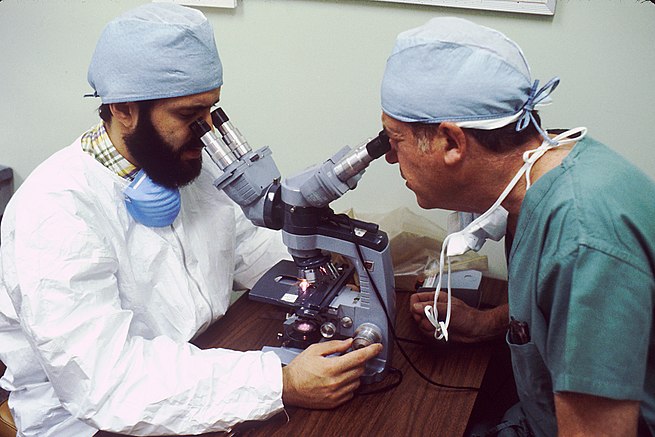
Main Difference
The main difference between Etiology and Pathology is that the Etiology is a study of causation, or origination and Pathology is a study and diagnosis of disease.
-
Etiology
Etiology (; alternatively aetiology or ætiology) is the study of causation, or origination. The word is derived from the Greek αἰτιολογία, aitiología, “giving a reason for” (αἰτία, aitía, “cause”; and -λογία, -logía). More completely, etiology is the study of the causes, origins, or reasons behind the way that things are, or the way they function, or it can refer to the causes themselves. The word is commonly used in medicine, (where it is a branch of medicine studying causes of diease) and in philosophy, but also in physics, psychology, government, geography, spatial analysis, theology, and biology, in reference to the causes or origins of various phenomena.
In the past, when many physical phenomena were not well understood or when histories were not recorded, myths often arose to provide etiologies. Thus, an etiological myth, or origin myth, is a myth that has arisen, been told over time or written to explain the origins of various social or natural phenomena. For example, Virgil’s Aenead is a national myth written to explain and glorify the origins of the Roman Empire. In theology, many religions have creation myths explaining the origins of the world or its relationship to believers.
-
Pathology
Pathology (from the Greek roots of pathos (πάθος), meaning “experience” or “suffering” whence the English word “path” is derived by transliteration, and -logia (-λογία), “study of”) is a significant component of the causal study of pathogens and a major field in modern medicine and diagnosis. Hence, ‘the study of paths’, by which disease comes.
The term pathology itself may be used broadly to refer to the study of disease in general, incorporating a wide range of bioscience research fields and medical practices (including plant pathology and veterinary pathology), or more narrowly to describe work within the contemporary medical field of “general pathology,” which includes a number of distinct but inter-related medical specialties that diagnose disease—mostly through analysis of tissue, cell, and body fluid samples. Used as a count noun, “a pathology” (plural, “pathologies”) can also refer to the predicted or actual progression of particular diseases (as in the statement “the many different forms of cancer have diverse pathologies”), and the affix path is sometimes used to indicate a state of disease in cases of both physical ailment (as in cardiomyopathy) and psychological conditions (such as psychopathy). Similarly, a pathological condition is one caused by disease, rather than occurring physiologically. A physician practicing pathology is called a pathologist.
As a field of general inquiry and research, pathology addresses four components of disease: cause, mechanisms of development (pathogenesis), structural alterations of cells (morphologic changes), and the consequences of changes (clinical manifestations). In common medical practice, general pathology is mostly concerned with analyzing known clinical abnormalities that are markers or precursors for both infectious and non-infectious disease and is conducted by experts in one of two major specialties, anatomical pathology and clinical pathology. Further divisions in specialty exist on the basis of the involved sample types (comparing, for example, cytopathology, hematopathology, and histopathology), organs (as in renal pathology), and physiological systems (oral pathology), as well as on the basis of the focus of the examination (as with forensic pathology).
The sense of the word pathology as a synonym of disease or pathosis is very common in health care. The persistence of this usage despite attempted proscription is discussed elsewhere.
-
Etiology (noun)
standard spelling of aetiology
-
Pathology (noun)
The branch of medicine concerned with the study of the nature of disease and its causes, processes, development, and consequences.
-
Pathology (noun)
The medical specialty that provides microscopy and other laboratory services (e.g., cytology, histology) to clinicians.
“The surgeon sent a specimen of the cyst to the pathology department for staining and analysis to determine its histologic subtype.”
-
Pathology (noun)
Pathosis: any deviation from a healthy or normal structure or function; abnormality; illness or malformation.
“abnormality|disease|illness|pathosis”
-
Pathology (noun)
the science of the causes and effects of diseases, especially the branch of medicine that deals with the laboratory examination of samples of body tissue for diagnostic or forensic purposes
“research people skilled in experimental pathology”
-
Pathology (noun)
pathological features considered collectively; the typical behaviour of a disease
“the pathology of Huntington’s disease”
-
Pathology (noun)
a pathological condition
“the dominant pathology is multiple sclerosis”
-
Pathology (noun)
mental, social, or linguistic abnormality or malfunction
“the city’s inability to cope with the pathology of a burgeoning underclass”
